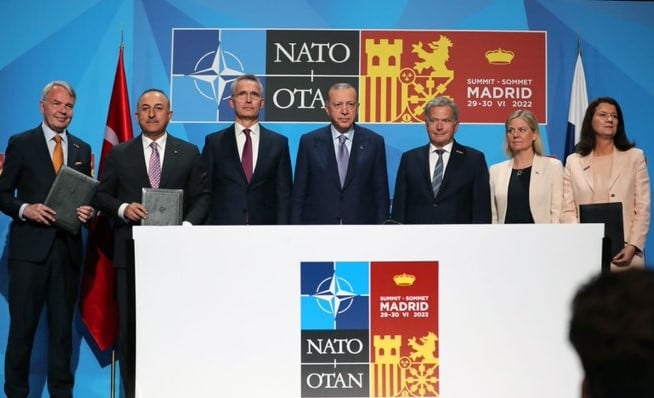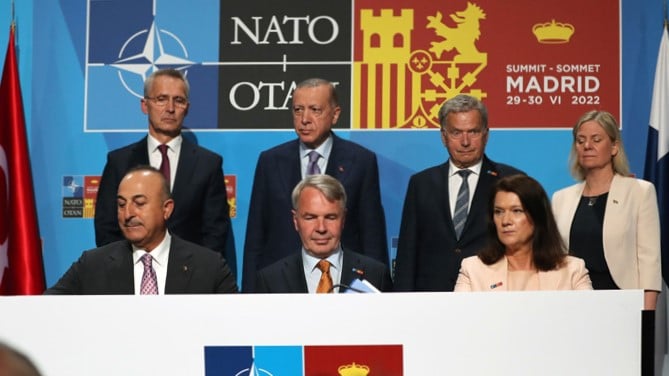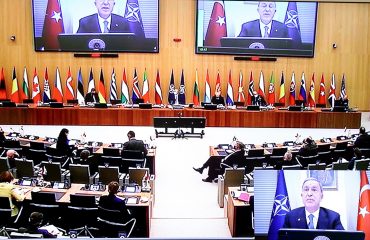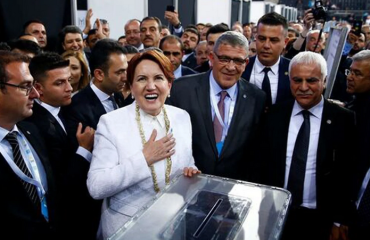

The trilateral memorandum, conducted by the NATO Secretary-General, and with the US orchestration from behind the document not only saved the historical summit from failure but also prevented Turkey from losing further ground in the West while achieving noteworthy progress in generating global support for its legitimate security concerns. (Photo: Turkish Presidency)
The recent trilateral Memorandum of Understanding (MOU) signed between Turkey, Sweden, and Finland, which set the stage for the most successful NATO summit since the Ukraine crisis started, reminded me of Obama’s leading from behind doctrine. The phrase was first coined by the Obama administration to describe President Obama’s Libyan strategy; leading from behind.
While the strategy largely failed in Libya allowing the crisis to deepen, it seems to have worked for President Biden in breaking NATO’s newest impasse. While the US stayed behind the scenes and paved the way for NATO Secretary-General Jens Stoltenberg to broker a Memorandum to overcome the blocking by Turkish President Recep Tayyip Erdoğan to start negotiations for the accession of Sweden and Finland, it would not have happened without the American President Joe Biden picking up the phone. Another important determinant was the diplomatic aptitude NATO’s Secretary-General Stoltenberg displayed throughout this crisis. Stoltenberg has earned respect and trust in Turkey in recent months which allowed him to successfully maneuver the negotiations between the three countries before the start of the historic NATO summit meeting in Madrid.
The trilateral memorandum
For many insiders, Stoltenberg was the hero of the historic NATO summit held in Madrid. The successful conclusion of the trilateral negotiations organized by Stoltenberg prevented the historic summit from ending in failure and paved the way for NATO’s new strategic concept to be adopted. A failure would have severely undermined the solidarity we now gained against Russian aggression and will hopefully culminate in Sweden and Finland joining the Alliance.
The Alliance was risking another historic crisis following Turkish objections against the membership of Sweden and Finland on the grounds that the two Nordic nations had embargoed Turkey from defense sales and allowed a safe haven for two separate terrorist organizations. Namely, the outlawed Kurdistan Workers’ Party (PKK) with its Syria branches PYD and YPG, and the illegal Fethullah Gülen network (called FETÖ by the Turkish government) which has been indicted to mastermind the 2016 coup attempt in Turkey. While a Turkish objection could have been anticipated, it seemingly came as a surprise for many and could harm the much-needed unity NATO enjoyed in the face of Russia’s invasion of Ukraine.
The American role: leading from behind
The United States did lead the NATO flock by staying in the shadows and pursued a strategy of silent diplomacy in line with the “Leading from Behind” doctrine paving the way for Stoltenberg to lead the negotiations. While many in the West waved away Turkey’s objections as another attempt by President Erdoğan to undermine the Alliance, from the beginning Secretary-General wisely recognized that Turkey’s expectations from Sweden and Finland were legitimate and understandable. This cemented Stoltenberg’s reputation as a fair broker in Turkey and as a respected facilitator with the two Scandinavian countries.
While President Biden was active as a behind-the-scenes interlocutor for Sweden and Finland strengthening their bid by hosting them in Washington, DC. Biden, together with America’s closest transatlantic ally, the United Kingdom, Biden made sure that the world understands that the two prospective members knew the US would rush to their defense even before their membership bids were concluded. He also made sure other Members embraced a similar balanced and self-confident tone to prevent the issue from escalating.
Biden and Erdoğan
President Biden’s last move enabling Stoltenberg was a simple phone call to President Erdoğan. From his first day in office, Biden has made sure that such a call and access to the White House, in general, has become a rare commodity for Erdoğan. He called his counterpart just before the Summit and promised a bilateral meeting with him in Madrid which was described in the White House readout call as an opportunity to discuss “the consequences of the Russian invasion of Ukraine on transatlantic security and other threats such as terrorism”. According to The New York Times, referring to an anonymous official in the American delegation, President Biden asked Erdoğan to “seize the moment”.
The trilateral meeting which began immediately upon the arrival of the Turkish delegation in Madrid lasted merely a few hours and resulted in the signing of the Trilateral Memorandum.
While Sweden and Finland had signaled very early on that they were ready to sign an agreement roughly in line with the text agreed upon in the MOU, Turkey evaded those efforts until the US indicated that a bilateral meeting between Biden and Erdoğan was dependent on progress in the trilateral MoU negotiations. With this tactical move, the US not only prevented the tripartite meeting from producing ambiguous results but also succeeded in preventing Erdoğan from bargaining additional conditions on the accession issue of Sweden and Finland in his face-to-face meeting with President Biden
The most important aspect of the MoU
The MoU is deliberately written in such a way that it enables all the signatories to claim some degree of “victory”. Careful attention to the text shows that it includes wording allowing a constructive level of ambiguity. A good example is that in certain clauses the word “will” (optional) was used instead of the word “shall” (binding) which are considered synonymous in Turkish translations but legally speaking are not necessarily substitutes for each other.
In this respect, the MoU can be interpreted differently in the future and is not technically binding in areas, such as controversial extradition requests by Turkey. However, the very existence of such a text imposes a legal precedent and a moral obligation for all NATO allies to be attentive and careful with its provisions when determining their policies. In this respect, it is a success for President Erdoğan and enjoys an undeniable moral weight.
Still belongs to the West
In my opinion, the document not only saved the historical summit from failure but also prevented Turkey from losing further ground in the West while achieving noteworthy progress in generating global support for its legitimate security concerns. It is difficult to predict to which extent the two prospective members will be able to stick to their commitments and to the spirit grandfathered in the provisions of the MOU. But even today, the historical importance of the document is undeniable and once again strengthens the argument Turkey ultimately belongs in the West.
While it is difficult to predict how the document will be implemented and whether a final veto by Turkey is still possible but we can safely state already that the memorandum together with a side-by-side photo from the Biden meeting has helped the Government domestically in the wake of an existential election.
The F-16 issue
The Erdoğan-Biden meeting, which lasted more than an hour, also created a rare occasion where warm messages were exchanged between the two leaders. Erdoğan even expressed his satisfaction by saying, “We are returning to our country with our hands full and fully satisfied.” But more tangible results can also be accredited to the MOU is signed. Prior to the meeting, media sources reported that Turkey’s F-16 modernization request would be the most important agenda item for Turkey.
The Biden administration responded before the meeting with an official statement signaling signs that they are eager to meet Turkey’s expectations. If certain interest groups are unable to sabotage the efforts of the Biden administration, it is fair to expect that Turkey’s bid to modernize its F-16 fleet as well as realize certain defense export acquisition will be remembered as another measurable and tangible externality of the negotiation.
Every victory has a price
Under the dire economic conditions pervasive in Turkey today, President Erdoğan is struggling to turn the historically high level of indecisive voters in the wake of the upcoming national elections next year. For opponents of Erdogan, a negative externality of the MOU is that it will help his efforts to be perceived as the savior of the Turkish world who alone can outsmart the West and defeat the enemies of Turkey. Considering the global economic recess which is expected to only deepen further and Turkey’s rapidly deteriorating relations with the EU and the USA, Turkey was wise not to delay lifting its objections. However, policymakers would also be wise to remember that a final veto is not impossible and will depend largely on whether Erdoğan thinks he can get away with it economically.


